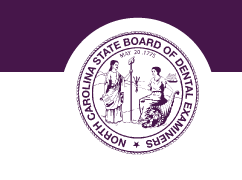|
Rules & Laws
License & Permits Anesthesia/Sedation Permits License Renewal Fees Verification/Disciplinary History Recent Disciplinary Actions Online Services Continuing Education Dental Assisting Filing Complaint Publications Meeting Announcements Management Arrangements Forms Professional Corporation Online Examination Board Newsletter |
|
||||||||||||||||
|
continuing education
(frequently asked questions) How will I report my continuing education hours? Continuing education became mandatory January 1, 1995. Every year, dentists must complete 15 hours and hygienists must complete 6 hours. The one-year period spans one calendar year (January to December being a calendar year). New licensees are not required to get CE the first year they are licensed, but need to obtain the appropriate hours the following years (therefore if you were initially licensed in 2006 you will not need to take CE in 2006, but will be required to do so beginning in 2007). In addition to the mandatory CE, both dentists and hygienists are required to maintain current CPR. The number of CE hours completed each year is reported on the license renewal form. No documentation of course work will be sent to the Board’s office. Each person is responsible for maintaining his/her own documentation of CE courses completed "for at least two years and shall be produced upon request of the Board." Do correspondence courses through professional journals count toward the required CE hours? The Board has determined that dentists may obtain any or all of their required 15 hours and hygienists may obtain any or all of their required 6 hours online or through correspondence courses which have post-tests and issue certificates of completion. Which courses and sponsors are approved for CE hours? 1. Courses must be directly related to patient care. Courses stressing practice management, for example, could not count, while courses in sterilization and infection control, pharmacology, dental materials and dental procedures are acceptable. 2. Approved sponsors for CE hours include: those providers who are recognized by the American Dental Association’s Continuing Education Recognition Program, courses sponsored the Academy of General Dentistry, the American Dental or American Dental Hygienists’ Association or components of such organizations, the North Carolina Area Health Education Centers, educational institutions with dental, dental hygiene or dental assisting schools or departments, national, state, or local societies or associations and local, state or federal governmental entities. (Study clubs are considered "associations.") What are the requirements for CPR? In May, 2011, the Board has changed their rules to require a hands-on or blended course; online courses will no longer be accepted. The new rule "CPR certification" means that the licensee has successfully completed a CPR course that meets American Red Cross or American Heart Association standards for certification and that provides manikin testing on the subjects of cardio-pulmonary resuscitation. The course must also cover the use of an automatic external defibrillator, unconscious and conscious choking and rescue breathing, provided that the foregoing requirements shall not be interpreted in any way that violates the Americans with Disabilities Act. The manikin testing must be provided by an instructor who is physically present with the students. CPR does not have to be repeated annually, if a 2 year certification is achieved; however the certification must always be current. Do retired dentists and hygienists have to take continuing education? The rule requiring continuing education of all licensees requires all licensed dentists and hygienists to take CE courses. If you have a license, you must complete the required number of hours. The only exception to this is for those dentists who have reached an advanced age and are retired or semi-retired and are exempted from CE by the Board. Only those individuals who request exemption and receive a Board letter indicating that they are exempt from the CE requirement are legally exempt. The Board defines:
If a dentist or dental hygienist has a disabling condition are they still required to take continuing education? A dentist or dental hygienist who has a disabling condition may request a variance in required continuing education hours during a particular period. Written documentation of a disabling condition that interferes with the licensee's ability to complete the required hours shall be provided to the Board. The Board may grant or deny such requests on a case by case basis. In considering the request, the Board may require additional documentation substantiating any specified disability. There is no provision to waive or vary CPR certification. Is there any provision for giving CE credit? Yes, a dentist or dental hygienist who is a full-time faculty member in a dental, dental hygiene or dental assisting school may receive credit (Dentists: 10 hrs./yr.; Hygienists: 4hrs./yr.). Part-time faculty, who work 20 hours per week or more, receives 1/2 the above. Also licensees who are affiliated with a federal, state, or county government agency whose operation is directly related to dentistry or dental auxiliaries (i.e., a county or state health department, a federal dental clinic, etc.) may receive 10 hours credit. Full-time employment would merit full credit; part-time (at least 20 hours per week) would merit 1/2 credit. Professionalism Course for Newly Licensed Dentists All dentists licensed after January 1, 2019 are required to take a six-hour course on Professionalism and Ethics. A course that meets this requirement will be offered by the NC Dental Society. Click here for information on registering for this course. continuing education (approved courses) |
|
||||||||||||||||




